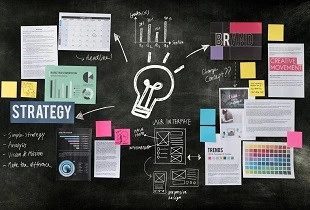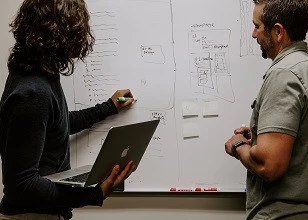Business as unusual or how to prepare the next normal
Emerging economies, disruptive business models and increasing environmental stress will require organizations to implement process changes much faster than before
Add bookmark
Managing the current crisis is the short-term mission, but the lesson to take from the crisis is that organizations must prepare for the future. Get your free trial of ARIS A4 now.
The current situation of the Covid-19 crisis is very volatile, varying from region to region: the crisis is declared 'manageable' despite many dramatic personal fates in most European countries, but we continue to see worrying infection hotspots.
Until a vaccine is available, companies will have to be flexible in reacting to scenarios that can change quickly. Key processes have fundamentally changed in many industries within a few weeks. Current demand is subject to large fluctuations; established supply chains and procurement, and distribution and sales processes, especially across borders, were massively disrupted.
However many companies have proven to be surprisingly flexible: spirits producers supplied alcohol for the production of disinfectants, and clothing manufacturers started producing face masks and protective suits right at the beginning of the crisis.
In many industries, the return to normality will be more a move toward a 'next normal':
- Will there be another global tourism including long-distance travel on the scale we know? Will the airplane remain an accepted means of transport even for short distances?
- Will business travel and conferences be replaced by video conferences and online events?
- Will there be a trend toward regional suppliers?
- What does this trend of digitization and "hypertechnologization" mean for the various industries (e.g. new forms like social shopping in retail)?
The Covid-19 crisis is currently the dominant example of massive change, but we are seeing a number of other disruptive changes that are putting a lot of pressure on companies to adapt, such as the rise of emerging economies, entrants with disruptive business models, and increasing environmental stress due to regulatory changes.
Companies will have to accept that business models and operating models change much faster than in the past – change is the new normal!
Software AG's ARIS A4 solution (Analyze – Act – Adapt – Achieve) helps you respond quickly to process challenges by:
- Creating transparency about the affected processes and resources
- Analyzing the risks and business impact of the current situation
- Supporting the description of changed processes, work instructions and decision handling
- Communicating these changes to every employee and workplace
- Providing the basis for a holistic Business Continuity Management System (BCMS)
Transparency and analysis
The solution provides exemplary reference process maps to define your individual processes quickly and easily. Processes are supplemented by dependencies on resources, infrastructure, IT systems and organizational units, and analyzed in terms of risk and impact. The result is a ranking of your core and support processes in order to identify the fields where action is needed.
Emergency plans and communication of changes
In order to respond to the most important challenges in your processes, the ARIS A4 solution helps to define emergency plans, change work instructions and reallocate tasks in order to respond to the resource situation and keep an eye on service levels. The focus is on keeping employees up-to-date on new processes and decisions – guaranteed by an information push mechanism.
Adaptation of standard processes: back to normal
After overcoming the hot phase of a crisis situation, it is important to learn from experience. Which emergencies have worked? Where are adjustments necessary? The solution provides the basis for a holistic business continuity management system (according to ISO 22301) that follows a continuous optimization cycle.





























































